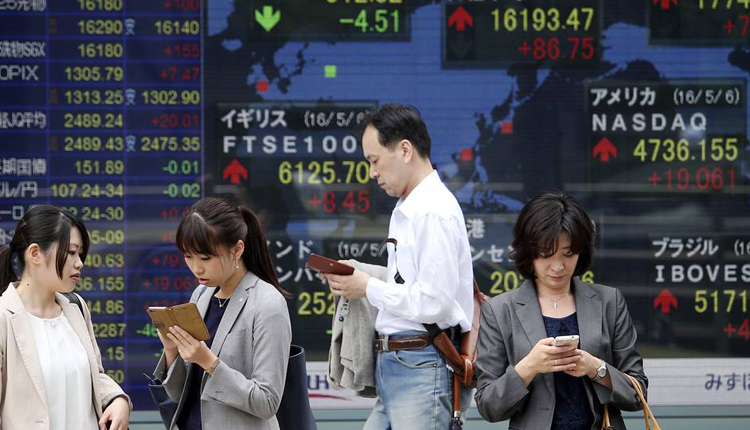Asian markets closed lower on the last trading day of the week as uncertainty over U.S.-China trade relations lingered.
Japan’s Nikkei 225 fell 1.33 percent, or 300.31 points, to close at 22,298.08, with miners and shipping sector stocks leading overall declines. Semiconductor-related plays were also down, with Tokyo Electron dropping 3.55 percent. All but one of the 33 Topix subindexes finished the day in negative territory.
Elsewhere, the Kospi pulled back by 0.91 percent to end at 2,282.79 as major technology names dragged the index lower. Samsung Electronics fell 3.2 percent and SK Hynix declined 3.72 percent.
The S&P/ASX 200 gave up early gains, edging down 0.31 percent to 6,278.40. Energy led losses, losing 1.75 percent, while the heavily weighted financials sector recorded slim gains.
In its monetary policy statement, the Reserve Bank of Australia said growth was likely to come in above 3 percent in 2018 and 2019. It also noted that inflation “is likely to be a bit lower in the near term.”
Chinese equities finished higher, bucking the overall downward trend in the region. The Shanghai Composite closed 0.04 percent higher at 2,795.44. The smaller Shenzhen Composite gained 0.69 percent for the day and the blue-chip CSI 300 rose 0.22 percent.
Hong Kong’s Hang Seng Index pulled back by 0.9 percent by 3:05 p.m. HK/SIN, with services, materials and energy weighing on the benchmark before the market close.
MSCI’s index of shares in Asia Pacific excluding Japan declined 1.02 percent in Asia afternoon trade.
That followed the mixed session seen stateside on Thursday. Major U.S. indexes traded flat for most of the day before slipping late in the session as investors focused on this quarter’s strong earnings. Nearly 90 percent of S&P 500 companies have reported quarterly results so far.
Trade concerns have also been in the spotlight, with China announcing earlier this week that it would retaliate against recent U.S. tariffs. The Chinese Ministry of Commerce announced Wednesday a 25 percent tariff on $16 billion in U.S. goods, a move that came after the U.S. Trade Representative’s office said duties on $16 billion in Chinese imports would take effect on Aug. 23.
“So far, there is still no sign of a return to negotiation and the likelihood is that it won’t happen until after the U.S. midterms,” said Shane Oliver, chief economist at AMP Capital.
Despite broader trade jitters, some analysts are optimistic about the global picture.
“Clearly trade is creating some angst in the emerging markets, but so is Fed policy. So anything that suggests that maybe the U.S. economy … just slows down a little bit, might get the Fed to maybe not tighten in December and I think emerging markets would like that,” Jack McIntyre, portfolio manager at Brandywine Global Investment Management, told CNBC’s “Squawk Box.”
The dollar extended gains on Friday, with the dollar index, which tracks the greenback against a basket of currencies, last at 95.992. Against the yen, the dollar softened to 111.02 at 2:48 p.m. HK/SIN, after earlier slipping below the 111 level during Asian trade.
Ahead, markets are expected to watch for the release of U.S. consumer inflation data, with economists expecting core Consumer Price Index, which excludes food and energy prices, to rise by 0.2 percent in July.
Other notable moves included the Turkish lira’s continued fall, with the currency touching a new low against the dollar after talks between officials from the U.S. and Turkey reportedly yielded no major progress. The lira slid 12 percent at one point, before paring some of those losses to trade at 5.9108 to the dollar at 2:51 p.m. HK/SIN.
Also of note was the Russian ruble, which was on the back foot after sliding on Thursday following news of U.S. sanctions on the country linked to an alleged poisoning in Britain earlier in the year. The currency traded at 66.8935 at 2:49 p.m. HK/SIN.
“U.S. introduction of new sanctions on Russia was a surprise given appearances of an uneventful Trump-Putin summit … This may signal that Trump could be compelled to escalate actions on U.S. geopolitical rivals ahead of key mid-term elections in November,” Vishnu Varathan, head of economics and strategy at Mizuho Bank, said in a note.
He added that China was “likely the next country that could see the U.S. administration devoting significant airtime to, particularly given perceptions of Chinese hostility in trade.”
Source: CNBC
